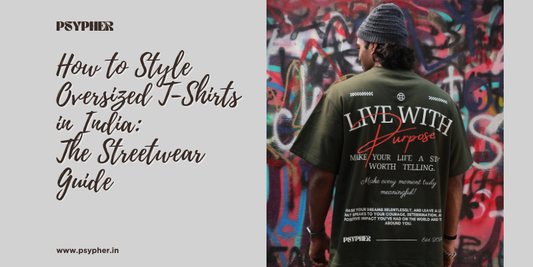— A Story to Be Told
When I first set out to build my streetwear brand, I knew one thing — it had to mean something.
Not just another name on a label.
Not just a cool word that looked good on a hoodie.
It needed depth. A vibe. A story.
I spent months, thinking about what that name could be. Something that felt personal, but also universal. A name that would capture the feeling of self-expression, rebellion, individuality, and storytelling — all in one.
The name I originally had in mind was P5YPH3R — a stylized version of Cipher, using numbers and letters in a way that almost looked like code. I loved how it looked: sharp, digital, mysterious. It resembled Psypher visually and gave it a hacker-culture, street-raw edge.
But then I realized something.
P5YPH3R would be confusing as hell to pronounce.
People would read it five different ways.
And while confusion can sometimes create curiosity, I didn’t want it to become a barrier.

So I stripped it back. Simplified it. Landed on Psypher.
Still unique. Still bold.
And yes… still a little confusing to pronounce.
But that’s the fun part.
“Is it Sai-fer? Sy-fer? See-fer?”
People ask me this all the time.
And here’s the thing:
I could tell you how to say it. But where’s the fun in that?
Why the Pronunciation Doesn’t Matter (And Why It Does)
Let me explain.
Brand names like Zomato have shown us how ambiguity in pronunciation can actually become a marketing advantage. It gets people talking. It sparks engagement. Suddenly your brand is more than a name — it’s a conversation.
Here’s why I’m not in a rush to set the record straight on Psypher:
Here are some reasons why a brand's pronunciation might be ambiguous or why owners might not give a definitive answer:
- Marketing Strategy/Engagement: As seen with Zomato, creating a conversation around pronunciation can be an effective way to generate publicity and engagement. It makes the brand memorable and encourages people to talk about it.
- Cultural Variations: A brand name might be pronounced differently in various regions or countries due to linguistic differences. Sometimes, brands embrace these variations rather than enforcing one "correct" way.
- Evolution of Language: Language evolves, and so do pronunciations. What was initially intended might change as the public adopts a particular way of saying it.
- Intentional Ambiguity: Some brand names are designed to be somewhat abstract or unique, and their pronunciation might not have a single, obvious answer. This can add to the brand's mystique.
- Focus on the Brand, Not the Word: Ultimately, the brand owners want you to remember their brand and what it offers, not necessarily get hung up on the precise phonetic pronunciation of its name. If the name is recognizable and easily searchable, that's often enough.
- It's Not a Priority: For some founders, the exact pronunciation might not be as critical as other aspects of the business, such as product development, customer service, or growth.
Why Psypher?
The truth is — it’s always been Cipher.
A cipher is a secret code — a hidden message waiting to be unlocked. And to me, that’s what streetwear really is: a visual language that only a few can truly read. It's not loud just to be loud — it speaks in attitude, in energy, in detail.
That’s exactly the soul I wanted Psypher to carry.
It’s not just a name — it’s a filter.
For the Few Who Can Decode It
And that’s the entire point of Psypher.
If you can’t pronounce it, that’s okay.
If you don’t get it, that's fine.
Because Psypher isn’t designed to be understood by everyone.
It’s for those who see streetwear as a form of expression.
For those who believe every thread should say something.
We don't sell clothes, we sell Fashion.
So if you know, you know.
If not?
Maybe you’ll get there ;)




